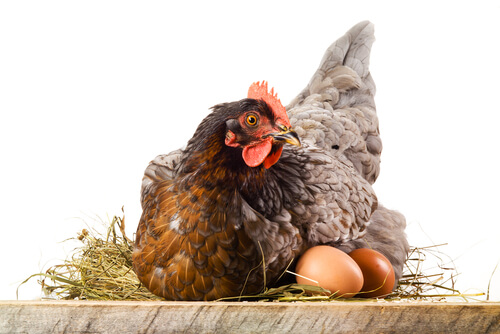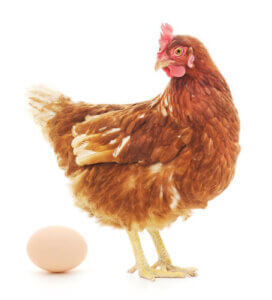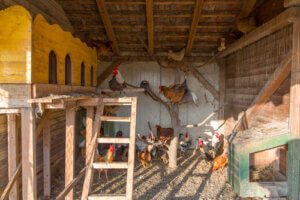Why Hens Eat Their Eggs

Chickens are the most abundant birds on the planet due to being bred for commercial purposes. Generally, it’s simple and profitable breeding that requires an average initial investment. However, many breeders are frightened when they see that hens eat their eggs. Why is this?
Unusual behavior in hens
First, we must understand that any change in an animal’s behavior can be a symptom of imbalance in its organism. It doesn’t matter if hen breeding is for commercial or simply recreational purposes. It’s fundamental to pay attention to unusual behavior patterns in order to maintain these birds in good health.
These domestic birds shouldn’t feed on their own eggs, as this is a risk for the survival of their species. Naturally, a hen should take care of its eggs after laying them in order to guarantee the birth of its chicks.
If the birds were to eat their eggs, they’d break their natural cycle of reproduction. And this would make little sense in a balanced environment.
However, facing adversity or imbalance in their habitat, many birds may adopt unusual behavior in order to survive. Food shortage, for example, could cause chickens to eat their eggs in order to replace nutritional deficiencies. But there are other possible causes that are listed below.

Why do hens eat their eggs?
Usually, this behavior stems from a small accident. The hen accidentally hits an egg with her beak and discovers a tasty substance inside. From there, it can get into the habit of breaking its own or other hens’ eggs to consume their fats and proteins. For this reason, artificial incubation is highly recommended.
As we can see, an unbalanced diet can also lead a hen to eat its own eggs. Generally, it’s a deficiency of proteins or calcium, which are found in abundance in the shell, yolk and egg white. Poor hydration can also lead the hen to break its eggs.
Errors in the lighting of the hen house can also lead to unusual behavior. Too much light on the nests, for example, can determine hens to eat their eggs. Moreover, if nests are located on the ground or are poorly padded, this behavior can also occur.
How to avoid situations where hens eat their eggs
Some simple preventive measures are usually very effective when you find that hens eat their eggs.
1. A balanced diet
First of all, it’s crucial to offer them a balanced diet, rich in protein, healthy fats, vitamins, and minerals. A well-fed hen won’t have to search in its own eggs for nutrients essential for its development. To avoid calcium deficiency, powdered seashells or chopped eggshells can be added to the diet.
Also, remember that laying hens often require a special diet. There are commercial feeds available exclusively for laying hens, with balanced nutritional proportions. Investing in a high-quality diet means a healthier hen and also better-quality eggs.
It’s also essential to make fresh and clean water available to your hens throughout the day. Hydration is also a key factor for egg quality.

2. The organization of the hen house
It’s fundamental to review the organization of the hen house and strategically place the nests. You must avoid nests left on the ground or with little padding inside. Nests must have enough material to be stable and protected, thus avoiding any accidents before, during and after laying.
Additionally, the laying place should be quiet and with dim light so as not to stress the laying hens. A stressed bird can display numerous behavioral problems, including eating its own eggs.
3. Identifying and isolating the ‘problem’ hen
Upon observing that eggs are missing or finding eaten eggs, it’s essential to identify the hens responsible. These birds are extremely intelligent and can learn quickly from the behavior of their peers.
You must observe them during laying and incubation in order to identify which hens eat their eggs. Afterward, it’s necessary to separate them from the other birds to prevent them from continuing to eat the eggs from the hen house. Also, it important to prevent the behavior from “spreading” to other hens.
All cited sources were thoroughly reviewed by our team to ensure their quality, reliability, currency, and validity. The bibliography of this article was considered reliable and of academic or scientific accuracy.
- Koçkaya, M., & Demirbas, Y. S. (2020). The use of carbetocin in the treatment of maternal cannibalism in dogs. Journal of Veterinary Behavior, 40, 98-102.
- Cloutier, S., Newberry, R. C., Honda, K., & Alldredge, J. R. (2002). Cannibalistic behaviour spread by social learning. Animal Behaviour, 63(6), 1153-1162.
- Marsboon, R., & Sierens, G. (1962). Treatment and prophylaxis of cannibalism in poultry with haloanisone-R 2028. Poultry Science, 41(3), 776-780.
- Glatz, P., & Bourke, M. (Eds.). (2006). Beak trimming handbook for egg producers: best practice for minimising cannibalism in poultry. Landlinks Press.
